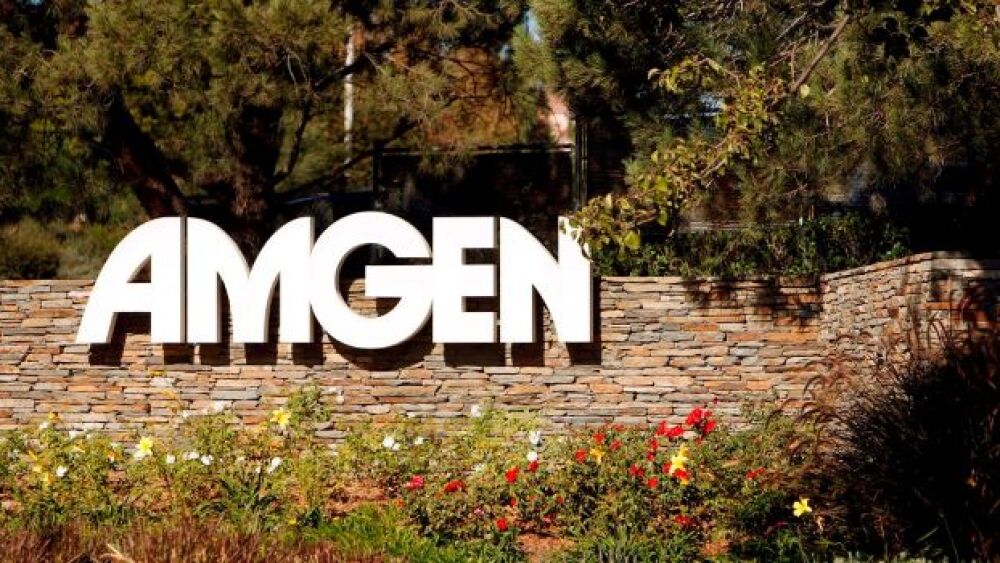The FDA gave the green light to Amgen’s Lumakras under accelerated approval as a treatment for patients with KRAS mutation whose disease has worsened over time.
Al Seib / Los Angeles Times via Getty Images
The U.S. Food and Drug Administration (FDA) gave the green light to Amgen’s Lumakras under accelerated approval as a treatment for patients diagnosed with non-small cell lung cancer with a specific gene mutation whose disease has worsened over time. It is the only FDA-approved treatment for this specific form of lung cancer.
Lumakras (sotorasib) was approved to treat adult patients with KRAS G12C-mutated locally advanced or metastatic non-small cell lung cancer (NSCLC), as determined by an FDA-approved test, who have received at least one prior systemic therapy. That test, the Guardant Health-developed Guardant360 CDx test, was also approved by the FDA alongside Lumakras. Amgen’s Lumakras will continue to be assessed in clinical studies to affirm its efficacy and safety.
David Reese, Amgen’s executive vice president of Research and Development, called the approval of Lumakras a “breakthrough moment” for patients with this specific kind of lung cancer. He said the patients would benefit from a targeted therapy for a mutation that has been elusive to researchers for decades.
“KRAS has challenged cancer researchers for more than 40 years, with many deeming it as ‘undruggable.’ The Lumakras development program was a race against cancer for Amgen’s scientists and clinical trial investigators who together have now successfully delivered this new medicine to patients in less than three years—from the first patient dosed to U.S. regulatory approval,” Reese said in a statement.
Darryl Sleep, Amgen’s chief medical officer and senior vice president of Medical Affairs, added that patients could only benefit from these targeted therapies if they are successfully tested for the biomarkers. He touted the coinciding approval of the Guardant360 CDx as an essential milestone in biomarker testing that will offer patients the benefit of personalized medicines.
The FDA’s accelerated approval decision for Lumakras was based on results from a subset of patients in the Phase II CodeBreak 100 study, the largest clinical trial for patients with the KRAS G12C mutation. In that study, patients who received Lumakras saw a confirmed objective response rate (ORR) of 36% and a disease control rate of 81%. Additionally, they also saw a median duration of response of 10 months. Lumakras was the first KRAS G12Cto demonstrate progression-free survival, with a median of 6.8 months.
The most common adverse reactions seen in the Phase II study were diarrhea, musculoskeletal pain, nausea, fatigue, hepatotoxicity and cough.
Approximately 84% of the 2.2 million new lung cancer diagnoses each year are NSCLC. It is estimated that 66% of patients with NSCLC have advanced or metastatic disease at initial diagnosis, and two out of three with lung adenocarcinoma harbor a driver mutation.
Amgen said that KRAS G12C is one of the most prevalent driver mutations in NSCLC, with about 13% of patients with non-squamous NSCLC in the U.S. having that particular mutation.
Bob T. Li, the principal investigator at Memorial Sloan Kettering Cancer Center, said Lumakras represents a “major advancement” in treating lung cancer patients with this mutation.
“Patients with non-small cell lung cancer who have progressed beyond first-line treatment face a poor prognosis and have limited treatment options available to them. Sotorasib delivers a new option for these patients, and it is the first KRAS-targeted therapy to be approved after nearly four decades of research,” he said in a statement.
Lumakras will have a list price of about $17,900 per month. Amgen is assessing Lumakras in other solid tumors that have a similar KRAS mutation.
Featured Jobs on BioSpace





